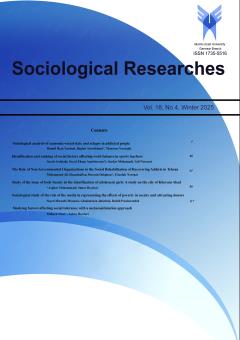The Role of Non-Governmental Organizations in the Social Rehabilitation of Recovering Addicts in Tehran
Subject Areas :Hosein Dehghan 1 * , Hosein noorozi 2 , آزاد ghazalsfloo 3
1 -
2 - گروه جامعه شناسی، واحد تهران شمال، دانشگاه آزاد اسلامی، تهران، ایران.
3 - گروه جامعه شناسی، واحد تهران شمال، دانشگاه آزاد اسلامی، تهران، ایران.
Keywords: NGOs, social rehabilitation, recovering addicts, social support, social participation,
Abstract :
In recent years, non-governmental organizations have increased greatly and have been active in various fields, including support and social rehabilitation of addicts. Therefore, this research was conducted with the aim of explaining the role of non-governmental organizations in the social rehabilitation of recovered drug addicts in Tehran. The research method was a survey. The statistical population included all recovered addicts who used the services of non-governmental organizations in Tehran. The sampling method was simple random and the sample size was 384 people. The tool for data collection was a researcher-made questionnaire. The method of data analysis was Pearson's correlation coefficient and regression analysis. The results of the correlation test showed that there is a significant positive and direct relationship between the amount of social support, satisfaction of needs, social participation and social monitoring of the social competence of addicts. The findings showed that the Pearson correlation coefficient between the amount of social support and social rehabilitation of recovered addicts is equal to 0.475. That is, the higher the level of social support, the higher the level of social rehabilitation of recovered addicts. The results of regression analysis showed that non-governmental organizations have an effect on the level of social support (5.9 percent), social participation (6.1 percent) and satisfaction of needs (1 percent). However, the
Nowadays, there has been a significant increase in non-governmental organizations (NGOs) operating across various fields, including the support and social rehabilitation of recovering people with addiction. This study aimed to answer the question, "What role do NGOs play in the social rehabilitation of recovering addicts in Tehran?" This research utilized a survey. The population included all recovering addicts who benefit from NGO services in Tehran. A sample size of 300 people took part in this survey. Data was collected using a questionnaire. Correlation test results revealed a significant direct relationship between social support, need satisfaction, social participation, and social supervision in enhancing the social rehabilitation of people with an addiction. Findings showed a positive and significant correlation (0.532) between NGO services and social rehabilitation. The services and support these organizations provide increase, and social rehabilitation improves. Additionally, the positive and significant correlations between social support (0.432), social control (0.421), need satisfaction (0.296), and social participation (0.354) with social rehabilitation suggest that an increase in each of these variables can contribute to improved social rehabilitation. The beta coefficient of 0.453 for NGOs indicates a positive impact on social rehabilitation, suggesting that NGOs, by creating support networks, providing essential services for recovering people with addiction and enhancing opportunities for social participation, create a suitable foundation for social rehabilitation.

